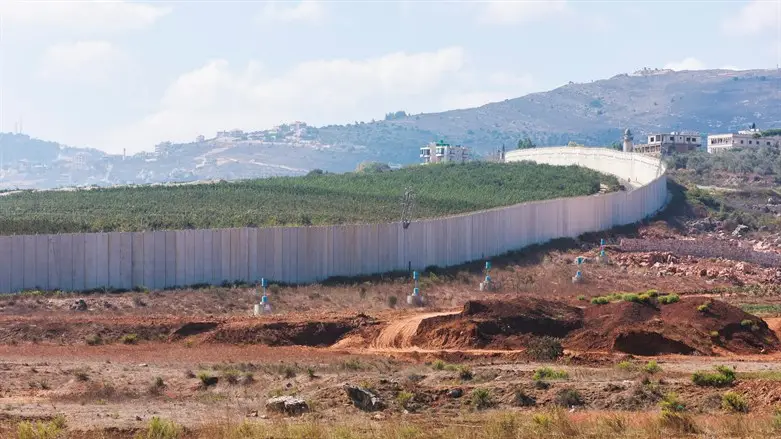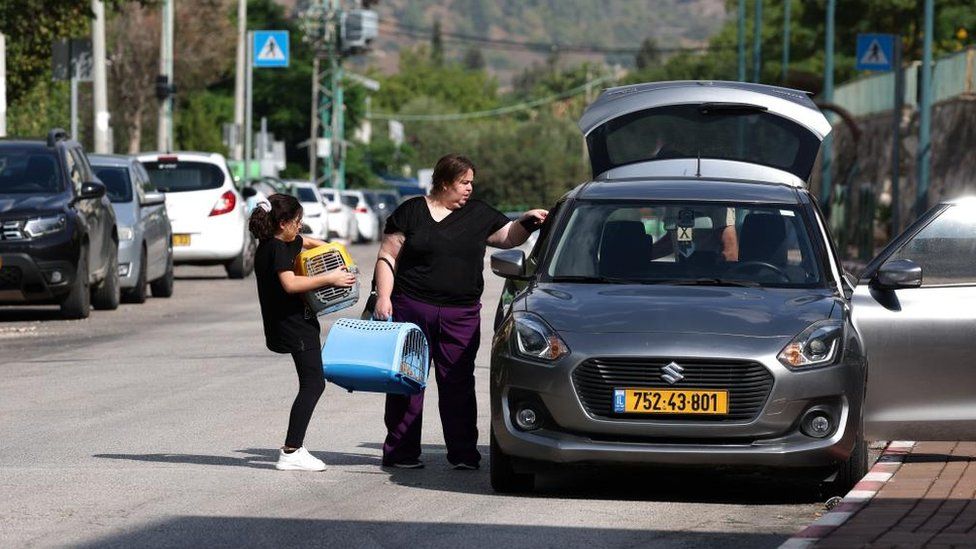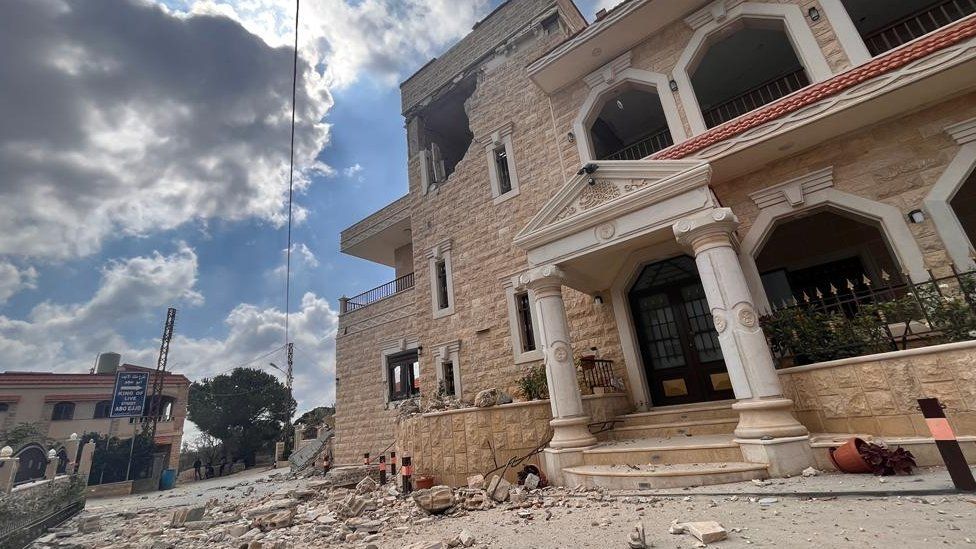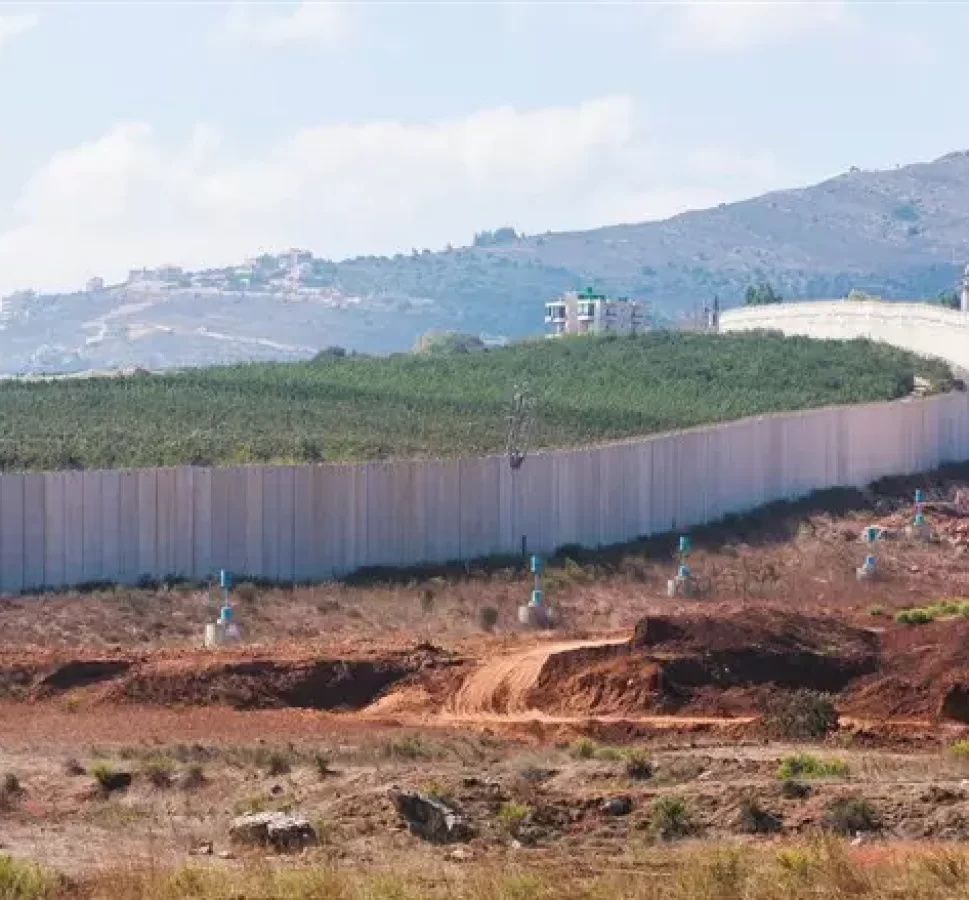
For days, tensions have been high along the Lebanese border with Israel, with frequent exchanges of fire between heavily armed militants in Lebanon and the Israeli army.
These skirmishes have prompted fears that the violence could escalate into a bigger confrontation.
Not far from the frontier on the Lebanese side, in the southern town of Bein Jbeil, there was quiet in the streets. Most shops were closed.
Many residents here, and in other border villages, have left, fearing that an escalation of the war between Israel and Hamas will turn this area, dominated by the powerful Shia Islamist group Hezbollah, into another front in the conflict.
Half a dozen men, among the few people seen outside, sat around a plastic table. Some ate pizza; others were smoking. They did not seem to be concerned.
“I’m not going to leave unless [the situation] gets out of hand, which I doubt,” 52-year-old Mohammed Baidoun said, under the watchful eye of a handful of Hezbollah minders, who came from multiple directions as soon as we arrived. “I have faith in the resistance that we have here… I believe deep down that [Hezbollah] will protect us.”
The question about what Hezbollah will do hangs over the whole country. The group, like Hamas, is considered a terrorist organisation by the UK, the US and others. Its leader, Hassan Nasrallah, has remained silent since the Israel-Hamas war broke out.
Naim Qassem, the Hezbollah number two, described the group as “fully ready”, saying they would not be intimidated by calls from the US and others to stay away. But their secretive nature means it is difficult to know what preparations they could be making.
Israel has long seen Hezbollah, which is also a social and political movement created in the 1980s, as a far more formidable force than Hamas: the group has a vast arsenal of weapons, including precision-guided missiles that can strike deep into Israeli territory, as well as tens of thousands of well-trained, battle-hardened fighters.

Hezbollah’s actions have been limited to cross-border strikes, along the UN-set Blue Line, the unofficial frontier between Lebanon and Israel.
The group has exchanged missiles and artillery fire with the Israeli military several times a day, while its allied Palestinian factions have also carried out attacks, including several attempted incursions into Israel from southern Lebanon.
The confrontations have resulted in deaths on both sides, including civilians.
Residents are fleeing on the Israeli side, too.
On Friday the Israeli military said it was evacuating people from the northern city of Kiryat Shmona, which has about 20,000 residents. It has been hit by rocket fire in recent days.
Days earlier it announced the evacuation of 28 communities and created a no-go zone within 2km of the border.
More on Israel-Gaza war
Tensions in Lebanon rose further on Tuesday, after an explosion at a hospital in Gaza.
Israel was immediately blamed by Hamas, but the Israeli military said the blast was caused by a misfired Palestinian militant rocket.
Hezbollah, however, described it as a “massacre” by Israel and, in Beirut, hundreds of its followers protested, chanting anti-American and anti-Israeli slogans. But it was a small demonstration for what the group had described as an “unprecedented day of anger”.
A source familiar with Hezbollah’s thinking, who spoke on condition of anonymity, said the group’s actions would be determined by what happens in Gaza. “If the Israelis invade [the territory],” the source said, “this will lead to a regional catastrophe”.

Some believe the decision about what to do next will likely come from Hezbollah’s main backer, Iran.
Israel accused Tehran of ordering Hezbollah to carry out a series of attacks on its territory last weekend. Tehran, meanwhile, warned that the “resistance front”, its alliance of forces in the region with groups in Syria, Iraq and Yemen, could carry out a “pre-emptive action”.
Before the latest outbreak of violence, the consensus among observers was that neither Israel nor Hezbollah were interested in another war, as many still remember the devastating month-long conflict they fought in 2006.
Lebanon is suffering from an economic crisis dating back years, and political infighting has left the country without a functioning government or president, while sectarian divisions have been exacerbated.
To the west of Bein Jbeil, in the border village of Dhayra, Israeli retaliatory strikes hit the local mosque and some houses last week.
Sabrina Fanash, a 36-year-old resident who moved to Beirut after the war started, was vocal in her criticism of militants who, she said, were using her Sunni-majority village for their attacks.
“It’s not fair that our houses are like that. Who will rebuild them?” she said, walking through the rubble of her cousin’s partially destroyed home.
“All of us are sad… We depend on God, God will protect us.”






